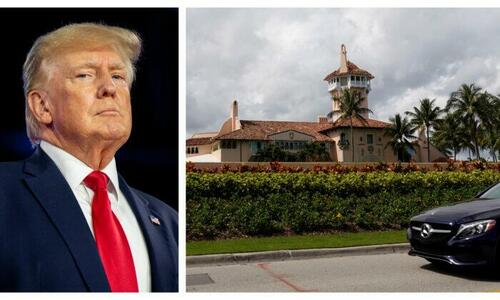
Authored by Jack Phillips via The Epoch Times (emphasis ours),
The Supreme Court on Monday declined to hear whether the Department of Justice (DOJ) can use its so-called “filter teams,” including the one that is being used to review documents seized at former President Donald Trump’s Mar-a-Lago.

In the Korf v. United States case, the nine justices declined to hear a writ of certiorari (pdf) that questioned the legality of the filter team protocols. The rules allow agents and prosecutors who aren’t assigned to a case to examine seized materials that are claimed to be privileged before a judge issues a ruling.
Like the vast majority of cases the Supreme Court declines to hear, the justices on Monday did not provide an explanation why it rejected the Korf petition.
The case pertained to a DOJ money laundering probe that claimed that the use of a filter team was a violation of the Constitution’s 6th Amendment right to counsel.
“Only after the filter team has reviewed the documents would a court rule on whether privilege applies. That procedure needlessly and harmfully exposes assertedly privileged communications to the government’s eyes,” lawyers for Mordechai Korf, who the DOJ targeted with a civil forfeiture complaint in January, said in their filing.
“It undermines essential protections for the adversary system,” the lawyers continued. “And it jeopardizes the confidentiality needed for the applicable privileges to serve their vital purposes.”
Trump Case
If the Supreme Court ruled on the case, it may have provided clarity for the DOJ and Trump’s legal team following the raid.
In September, a district judge sided with Trump’s team in appointing a special master to review documents that were taken during the raid on Aug. 8 that the former president said was unprecedented and politically motivated.
Lawyers for the DOJ confirmed the agency used a filter team to start its review of the documents that were collected during the FBI search, according to court filings. DOJ attorneys further argued that because a preliminary review of the documents was completed, it would not be necessary to appoint a special master.
A Sept. 1 court filing from Trump, meanwhile, asserted that the DOJ filter team never communicated with his team following the FBI raid.
“Never has an argument against ‘interference’ better underscored the need for judicial involvement,” the filing read. “All of this in the context of a unilateral filter team operation that to-date has never made any contact with counsel for the Movant, another historic first for DOJ.”
His lawyers suggested that the DOJ team would possibly “impugn, leak, and publicize selective aspects” of their probe to damage Trump.
The former president, who said the FBI-seized materials were declassified by him, has long argued the FBI and DOJ have unfairly targeted him since when he was a candidate during the 2016 election.
Authored by Jack Phillips via The Epoch Times (emphasis ours),
The Supreme Court on Monday declined to hear whether the Department of Justice (DOJ) can use its so-called “filter teams,” including the one that is being used to review documents seized at former President Donald Trump’s Mar-a-Lago.

In the Korf v. United States case, the nine justices declined to hear a writ of certiorari (pdf) that questioned the legality of the filter team protocols. The rules allow agents and prosecutors who aren’t assigned to a case to examine seized materials that are claimed to be privileged before a judge issues a ruling.
Like the vast majority of cases the Supreme Court declines to hear, the justices on Monday did not provide an explanation why it rejected the Korf petition.
The case pertained to a DOJ money laundering probe that claimed that the use of a filter team was a violation of the Constitution’s 6th Amendment right to counsel.
“Only after the filter team has reviewed the documents would a court rule on whether privilege applies. That procedure needlessly and harmfully exposes assertedly privileged communications to the government’s eyes,” lawyers for Mordechai Korf, who the DOJ targeted with a civil forfeiture complaint in January, said in their filing.
“It undermines essential protections for the adversary system,” the lawyers continued. “And it jeopardizes the confidentiality needed for the applicable privileges to serve their vital purposes.”
Trump Case
If the Supreme Court ruled on the case, it may have provided clarity for the DOJ and Trump’s legal team following the raid.
In September, a district judge sided with Trump’s team in appointing a special master to review documents that were taken during the raid on Aug. 8 that the former president said was unprecedented and politically motivated.
Lawyers for the DOJ confirmed the agency used a filter team to start its review of the documents that were collected during the FBI search, according to court filings. DOJ attorneys further argued that because a preliminary review of the documents was completed, it would not be necessary to appoint a special master.
A Sept. 1 court filing from Trump, meanwhile, asserted that the DOJ filter team never communicated with his team following the FBI raid.
“Never has an argument against ‘interference’ better underscored the need for judicial involvement,” the filing read. “All of this in the context of a unilateral filter team operation that to-date has never made any contact with counsel for the Movant, another historic first for DOJ.”
His lawyers suggested that the DOJ team would possibly “impugn, leak, and publicize selective aspects” of their probe to damage Trump.
The former president, who said the FBI-seized materials were declassified by him, has long argued the FBI and DOJ have unfairly targeted him since when he was a candidate during the 2016 election.






